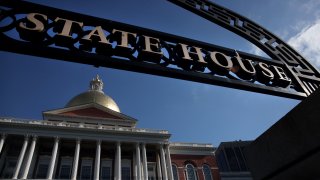
With just a handful of hours left to strike agreements and pass them, a House leader told the News Service that "the whole fiscal picture" is now being reconsidered as talks continue around a massive economic development and tax reform bill that's been complicated by the realization that an existing law could trigger nearly $3 billion in tax relief this year.
The reemergence in recent days of Chapter 62F, a law from 1986 that has not been triggered since 1987 but which is poised to send roughly $3 billion back to taxpayers, is weighing heavily on the economic development bill talks as negotiators reevaluate the Legislature's spending decisions in that more than $4 billion bill and the decision to include $500 million in one-time tax rebates and $500 million in permanent tax cuts in it.
"I think we have to figure we have to figure out whether we want to take that risk right now," Rep. Alice Peisch, the House's Education Committee chair, told the News Service Sunday night. "There are things we can do later if things look better. I'm not sure what the what the answer is, but I know that since this came up this has really thrown a real wrench in the works. And what I hear is that everything is on the table. It's not just a question of negotiating the last few pieces of some bills with the Senate. It's suddenly having to look at the whole fiscal picture, because these bills were developed without having any idea that this was on the horizon."
The Chapter 62F tax relief would come from excess fiscal year 2022 state tax revenue and the economic development bill was already in line to tap that same source for some of its spending, with fiscal year 2023 revenues, borrowing or American Rescue Plan Act funding accounting for most of the support in that bill.
Get Boston local news, weather forecasts, lifestyle and entertainment stories to your inbox. Sign up for NBC Boston’s newsletters.
"That's the question that I think people are grappling with, is do we have enough money? Is there enough money to fund the budget, the economic development plan and this unknown amount in September?" Peisch said. "And then, for me, and I think for many of my colleagues, the second question is and what does that mean for the next fiscal year, when we may be, if we're not already, in the middle of a recession, we may see a significant decline in revenues."
Gov. Charlie Baker, whose administration is already looking ahead to how it might make the Chapter 62F tax relief a reality for taxpayers, has said he thinks that both the statutorily-required 62F relief and the Legislature's roughly $1 billion tax plan are "eminently affordable" given that state tax revenues have soared 15 percent and 20 percent in the last two years, respectively.
Peisch said inflation is also a concern for state government.
Local
In-depth news coverage of the Greater Boston Area.
"It seems to me that spending all this money right now with all those other costs that I know we have -- we are obligated to -- I'm not as confident that we do that we do have enough money to do all of this," she said. "And maybe, you know, maybe by the end of tonight, we'll have some information that will lead us to believe that we can do it, but I'm skeptical."
She said the shifting picture makes her "a little nervous" about fully funding the K-12 Student Opportunity Act in the coming years and continuing early education investments that she said are "going to require significant dollars in the next several fiscal years, I would imagine."
Senate Ways and Means Chairman Michael Rodrigues -- who is leading the negotiations for the Senate on the massive economic development bill, sports betting and cannabis industry reforms -- said he's confident that some of the major issues still hung up in negotiations will emerge for votes Sunday night.
"There are a lot of people working very hard on a lot of issues. Communication is open, constant and robust and I'm confident," Rodrigues told a clutch of reporters that followed him from the Senate Chamber to his office. "This is my 14th end of session and it's just like all the rest."
Rodrigues would not disclose specifics about how those talks are progressing, other than to say "everything's going well."
Asked about a rumor that circulated at the State House on Sunday that the economic development conference committee might not come to an agreement in part due to the sticky issue of 62F, Rodrigues would neither confirm nor deny it.
"That would be disappointing," he said before adding, "If I had a nickel for every rumor I heard in this building, I'd be a millionaire."



